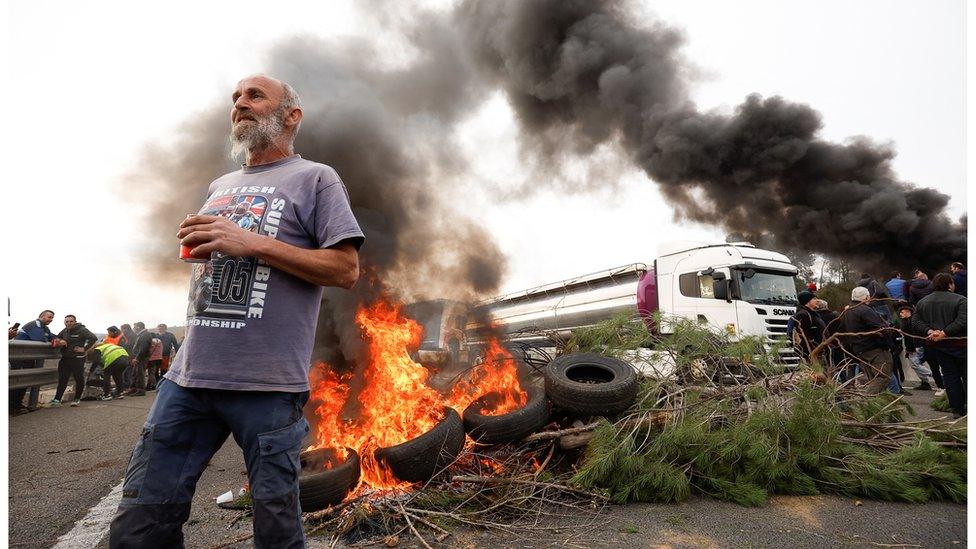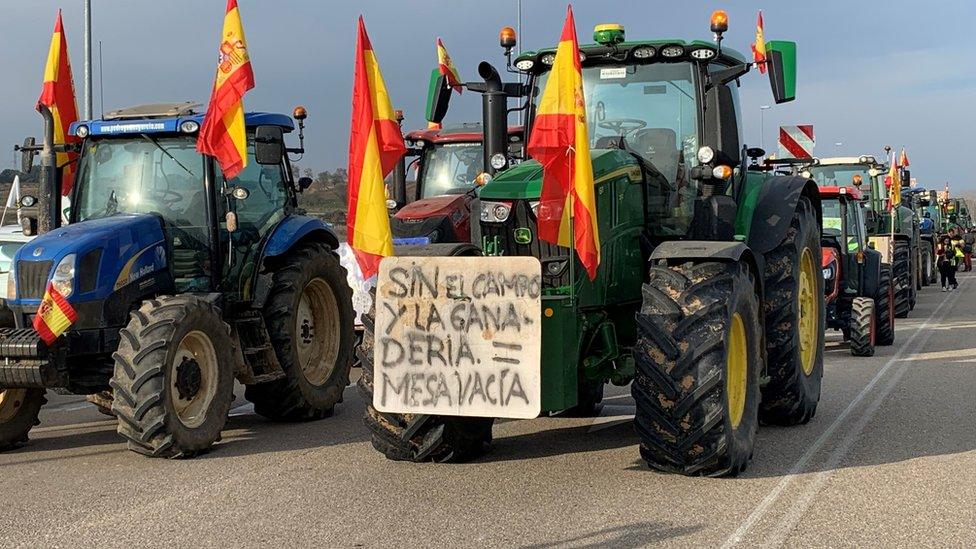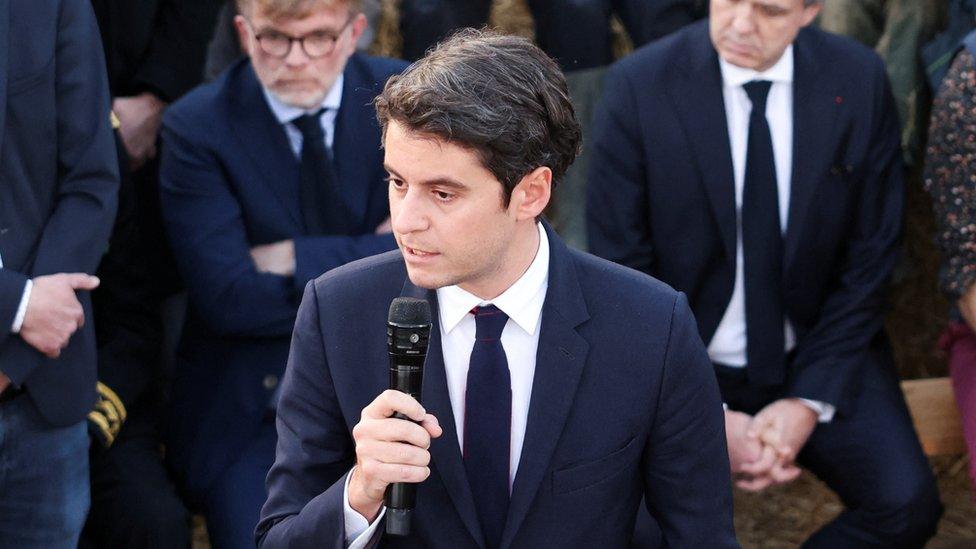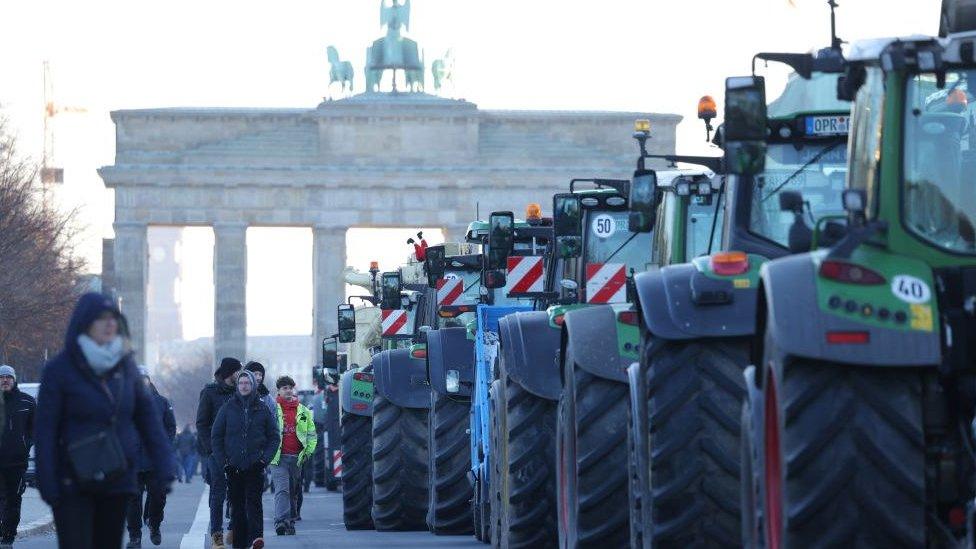Europe farmers protests: EU scraps plans to halve pesticide use
- Published

Farmers in several EU countries are trying to put pressure on the EU and their governments to address their grievances
The head of the European Commission, Ursula von der Leyen, has announced plans to scrap a proposal halving pesticide use across the EU.
The move is an apparent concession to farmers who have been protesting in many EU countries against regulations including the planned reduction in pesticide use.
Ms von der Leyen said the proposal had become a "symbol of polarisation".
The reversal still needs to be formally approved.
Pesticide reduction is among a number of grievances that farmers in countries including France, Belgium and the Netherlands have been demonstrating against in recent weeks.
They argue that reducing the amount of pesticide they are allowed to use will negatively impact their crops and therefore put food production in the EU at risk.
"Our farmers deserve to be listened to," Ms Von der Leyen told the European Parliament on Tuesday.
"I know that they are worried about the future of agriculture and their future as farmers."
Ms Von der Leyen also said the issue of pesticide use had not gone away and that further conversations would be needed before a new proposal to reduce them can be put forward.
The EU had aimed to halve the use of the chemicals by 2030 as part of its Green Deal, which is aimed at tackling climate change.
Its proposal also included a ban on the use of pesticides in areas including public parks and gardens, schools and sports fields.
The plan had already run into issues and was rejected by the European Parliament in November.
Tuesday's announcement that it is being scrapped has been welcomed by some, including the European farmers' lobby COPA-COGECA.
The group's president, Christiane Lambert, said that the EU Commission - the bloc's executive arm - had "finally acknowledging that the approach was not the right one".
"This top-down proposal...was poorly designed, poorly evaluated, poorly financed, and offered little alternatives to farmers," she wrote on X, formerly Twitter.
Others, including Green MEP Bas Eickhout were against the U-turn. He urged Ms Von der Leyen to come up with a new plan for reducing pesticide use.
He said it was in everyone's interests, including farmers', to do so.
The EU is facing increasing demands from member states to change its approach to climate change in the wake of the growing farmer protests.
On Tuesday, it also recommended that net greenhouse gas emissions be slashed by 90% by 2040, compared to 2015 levels - but reduced the specific demands on the agricultural sector.
"We need to make sure we have a balanced approach," said European Commissioner Wopke Hoekstra, who unveiled the proposal.
"The vast majority of our citizens sees the effects of climate change, does want protection, but is also worried about what that implies for their livelihood."
The emissions announcement did not satisfy some, including Alexandr Vondra - a member of the eurosceptic European Conservatives and Reformists Group.
He described the EU targets as "unrealistic ambitions", according to the Reuters news agency.
Tuesday's announcements come almost a week after the EU gave its first concession to the farmers, announcing it would delay rules forcing them to leave parts of their land unused in order to protect the environment.
Meanwhile, the protests are continuing.
Spain and Bulgaria on Tuesday saw hundreds of their farmers take to the streets - blocking roads and causing severe disruption to motorists.
Like farmers elsewhere, they demand more flexibility from the EU, tighter controls on the produce of non-EU countries and more help from their government.
Greek farmers have also been discussing the possibility of blocking key roads in order to try and force the government to agree to their demands.
Related topics
- Published6 February 2024

- Published26 January 2024

- Published15 January 2024
